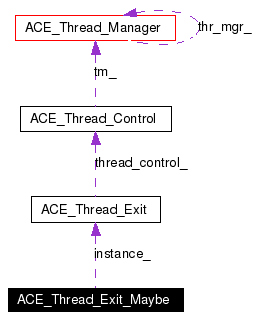
#include <Thread_Exit.h>
Collaboration diagram for ACE_Thread_Exit_Maybe:

Public Member Functions | |
| ACE_Thread_Exit_Maybe (int flag=0) | |
| Don't create an ACE_Thread_Exit instance by default. | |
| ~ACE_Thread_Exit_Maybe (void) | |
| Destroys the underlying ACE_Thread_Exit instance if it exists. | |
| ACE_Thread_Exit * | operator-> (void) const |
| Delegates to underlying instance. | |
| ACE_Thread_Exit * | instance (void) const |
| Returns the underlying instance. | |
Private Attributes | |
| ACE_Thread_Exit * | instance_ |
| Holds the underlying instance. | |
Allows the appearance of a "smart pointer", but is not always created.
Definition at line 86 of file Thread_Exit.h.
|
|
Don't create an ACE_Thread_Exit instance by default.
Definition at line 97 of file Thread_Exit.cpp. References ACE_NEW.
00098 : instance_ (0) 00099 { 00100 if (flag) 00101 { 00102 ACE_NEW (instance_, ACE_Thread_Exit); 00103 } 00104 } |
|
|
Destroys the underlying ACE_Thread_Exit instance if it exists.
Definition at line 106 of file Thread_Exit.cpp.
00107 {
00108 delete this->instance_;
00109 }
|
|
|
Returns the underlying instance.
Definition at line 118 of file Thread_Exit.cpp. Referenced by ACE_Thread_Adapter::invoke().
00119 {
00120 return this->instance_;
00121 }
|
|
|
Delegates to underlying instance.
Definition at line 112 of file Thread_Exit.cpp.
00113 {
00114 return this->instance_;
00115 }
|
|
|
Holds the underlying instance.
Definition at line 104 of file Thread_Exit.h. |
 1.3.6
1.3.6